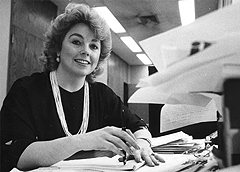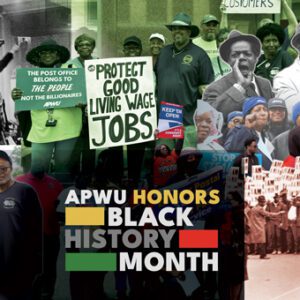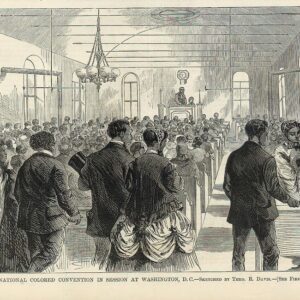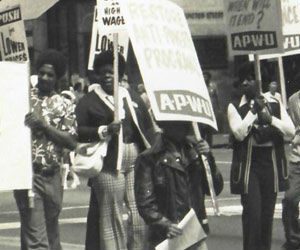March 31, 2011
Regina V. Polk: Breaking the Mold
“I only met Regina Polk once. Briefly. That’s a teamster? I thought. The beauty? The cape? The high heels? The perfect make-up? Where’s the beer belly and the donut? The scowl and the crowbar?” – Terry Spencer Hesser
Regina V. Polk fought diligently for workers’ rights, working as a labor organizer and business agent for the Teamsters in the late 1970s and early 1980s, defying stereotypes and empowering women in a male-dominated workforce.
‘A Woman Who Cared’
Friend and mentor Ray Hamilton described Polk — known as Gina to family and friends — as a fighter. “She struggled for the rights of unorganized workers. She championed the rights of union members to get the best contract possible, and then to make sure they received the full benefits of their contracts,” he said. “But most of all, she was a woman who cared.”
Born on Feb. 14, 1950, to cotton and alfalfa farmers in Casa Grande, AZ, Polk’s upbringing was often difficult. The family was impoverished, and Eileen Polk said of her younger sister, “Before she even knew what social justice meant, she was out there, fighting for the proverbial underdog. Whether it was with people or animals, she loved helping others.”
Polk’s work ethic — and her compassion for others — led her to join the Civil Air Patrol where she assisted in a number of rescue and recovery operations in southeastern Arizona. At just 14 years old, Polk rode in rescue planes as a spotter and helped adult crews with rescue strategy.
After high school, Polk was pushed by her mother to attend Mills College, an all-women’s liberal arts school. A sociology major, she felt like an outsider because her family’s poor financial condition drove a wedge between her and her wealthier classmates.
From ‘Bystander’ to ‘Warrior’
Polk’s experience with social inequality led to a deep interest and involvement in politics. She participated in antiwar protests, particularly at nearby University of California at Berkeley, a hotbed of movements for social justice, civil rights, and women’s liberation.
While at a Berkeley protest, Polk — a bystander — was sprayed with tear gas by police. This incident led her to become more “anti-establishment” and increasingly active in politics.
 To support herself while she was in graduate school, Polk took a job at Chicago’s Red Star Inn as a hostess, and discovered that her co-workers — dishwashers, busboys, waitresses, and kitchen help – were all treated poorly. They were overworked, underpaid, verbally demeaned – and unorganized. In an effort to correct this injustice, Polk repeatedly tried to contact the Hotel and Restaurant Employees Union to ask for help, and was directed to Bob Simpson, Organizing Director for Teamsters Local 743.
To support herself while she was in graduate school, Polk took a job at Chicago’s Red Star Inn as a hostess, and discovered that her co-workers — dishwashers, busboys, waitresses, and kitchen help – were all treated poorly. They were overworked, underpaid, verbally demeaned – and unorganized. In an effort to correct this injustice, Polk repeatedly tried to contact the Hotel and Restaurant Employees Union to ask for help, and was directed to Bob Simpson, Organizing Director for Teamsters Local 743.
Simpson described Gina as a hippie: “The way she dressed and looked. She was for all kinds of rights. Worker rights. Civil rights. Women’s lib,” Simpson said.
Despite an initial lack of enthusiasm for organizing the Red Star Inn, Simpson agreed to give Polk a batch of Teamsters cards, and instructed her that the union had to sign up at least 51 percent of eligible employees in order to gain recognition. Polk was successful in organizing the employees, which was a difficult task because most feared they would lose their job if they were found to be organizing by management.
Once the owner of the Red Star Inn discovered what Polk was doing, he fired her. Simpson helped Polk file an unfair labor practice charge against her former employer, and then hired the young organizer to work for his Teamsters local. Her first part-time assignments included writing and distributing leaflets, working telephone banks, and walking picket lines.
‘A Real Trade Unionist’
Simpson said workers responded to her, and she was “very bright, aggressive, and sincere, strictly a worker’s type person. She was a real trade unionist.”
In 1975, with Simpson’s encouragement, Polk interviewed with Don Peters — the founder and leader of Teamsters Local 743 for more than 25 years — for a full-time job. At their first meeting, Peters told Polk about an ongoing campaign to organize the mostly female administrative and clerical workers at Blue Cross/Blue Shield. Polk said she was up for the challenge — and was hired.
As a young female with a college degree in the male-dominated world of labor organizing, Polk faced her fair share of opponents. However, her dedication for the cause earned her the respect and love of many, and she never considered herself to be “off-duty.”
Once, while driving down a rural road at night in Cook County, IL, Polk noticed six factory workers — all men — carrying homemade picket signs in front of the Diesel Recon Company, an engine manufacturer. She stopped her car, explained what the Teamsters could do for them; signed them up on the spot, and later played an important role in negotiating their contract.
Another time, Polk chased down an 18-wheel tractor-trailer driver who had unsuccessfully tried to cross one of her picket lines. Polk chased him in angry pursuit, forced the driver out of the truck, followed him into a nearby bar, and convinced him not to break the strike.
By 1980, Polk was featured in Time magazine and The New York Times, and her reputation grew as a “brazen, unapologetic warrior with a talent for handling grievances, most notably for employees at Blue Cross/Blue Shield, the University of Chicago Hospital, Chicago State University, and Governors State University,” Hesser wrote in a biography of Polk.
When Governors State University stalled negotiations with the Teamsters, Polk arranged for a workers’ strike to occur on the same day that 3,000 special-needs children were scheduled to arrive on campus for the Special Olympics. Governors State, fearful of negative publicity, settled the contract the very next day and averted the strike.
Death in the Line of Duty
Because of her efforts on behalf of working men and women across the country, 31-year-old Polk was invited to deliver the keynote speech at the Teamsters Local 743’s annual Steward’s Seminar in May 1981 — known to union members as the “Teamsters Prom” — and received a standing ovation from the audience.
Polk’s passion for working Americans enabled the young power. “Imagine an environment dominated by men unconsciously Further imagine a young working-class woman courageously embracing the principle of justice for all workers and compelled to navigate a terrain dominated by complex, flawed, sometimes deeply compromised and always powerful men,” said Robert Bruno, Labor Education Director at the University of Illinois.
On Oct. 12, 1983, the 33-year-old Polk was set to travel on a fundraising mission in Carbondale, IL, and would attend a meeting to help dislocated workers gain better access to job training. Just after 9 p.m., Polk, seven passengers, and three crew members were killed when their Air Illinois aircraft crashed.
“To the members of Local 743, who were represented by Regina Polk: You know that you had the finest union representative, ever. She loved you and would do anything for you. Yes, her personal safety, her freedom, and even her life were yours. There was never a more dedicated person in the American labor movement,” Ray Hamilton said at Polk’s funeral.
In 1983, the Regina V. Polk Scholarship Fund for Labor Leadership was founded, and since then, it has made $780,000 in grants benefiting more than 650 women in an effort to teach new generations how to fight for their rights – and the rights of all employees.
Editor’s note: Information for this article was taken from a biography written by Terry Spencer Hesser, “I Am A Teamster.”




